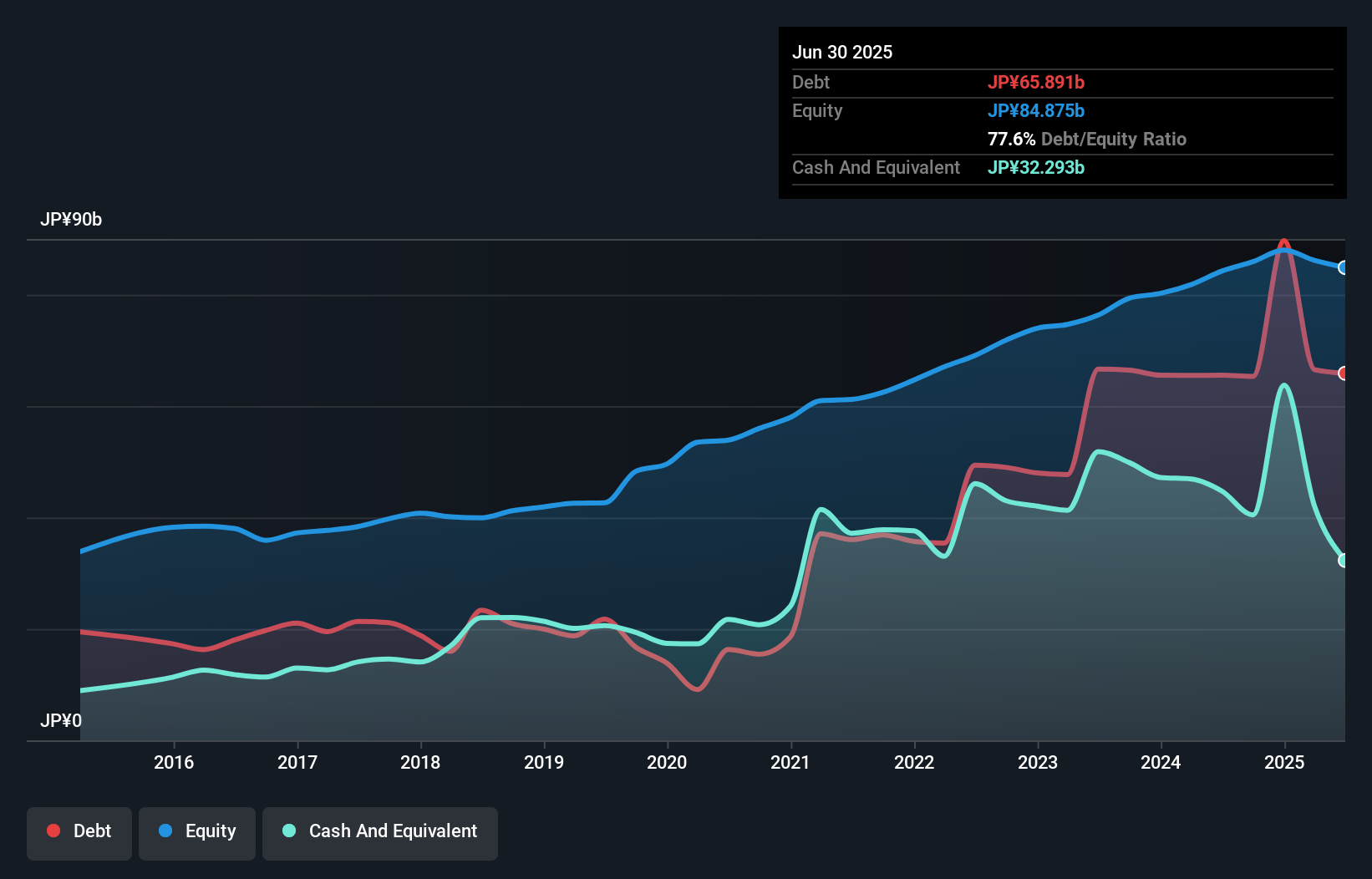The external fund manager backed by Berkshire Hathaway's Charlie Munger, Li Lu, makes no bones about it when he says 'The biggest investment risk is not the volatility of prices, but whether you will suffer a permanent loss of capital.' When we think about how risky a company is, we always like to look at its use of debt, since debt overload can lead to ruin. We can see that Menicon Co., Ltd. (TSE:7780) does use debt in its business. But is this debt a concern to shareholders?
When Is Debt A Problem?
Debt assists a business until the business has trouble paying it off, either with new capital or with free cash flow. In the worst case scenario, a company can go bankrupt if it cannot pay its creditors. However, a more frequent (but still costly) occurrence is where a company must issue shares at bargain-basement prices, permanently diluting shareholders, just to shore up its balance sheet. By replacing dilution, though, debt can be an extremely good tool for businesses that need capital to invest in growth at high rates of return. When we think about a company's use of debt, we first look at cash and debt together.
What Is Menicon's Net Debt?
The chart below, which you can click on for greater detail, shows that Menicon had JP¥65.9b in debt in June 2025; about the same as the year before. However, because it has a cash reserve of JP¥32.3b, its net debt is less, at about JP¥33.6b.

A Look At Menicon's Liabilities
According to the last reported balance sheet, Menicon had liabilities of JP¥24.3b due within 12 months, and liabilities of JP¥73.4b due beyond 12 months. On the other hand, it had cash of JP¥32.3b and JP¥13.6b worth of receivables due within a year. So its liabilities outweigh the sum of its cash and (near-term) receivables by JP¥51.8b.
While this might seem like a lot, it is not so bad since Menicon has a market capitalization of JP¥99.9b, and so it could probably strengthen its balance sheet by raising capital if it needed to. But it's clear that we should definitely closely examine whether it can manage its debt without dilution.
View our latest analysis for Menicon
We measure a company's debt load relative to its earnings power by looking at its net debt divided by its earnings before interest, tax, depreciation, and amortization (EBITDA) and by calculating how easily its earnings before interest and tax (EBIT) cover its interest expense (interest cover). This way, we consider both the absolute quantum of the debt, as well as the interest rates paid on it.
Menicon's net debt to EBITDA ratio of about 1.9 suggests only moderate use of debt. And its strong interest cover of 14.7 times, makes us even more comfortable. Menicon grew its EBIT by 9.6% in the last year. That's far from incredible but it is a good thing, when it comes to paying off debt. When analysing debt levels, the balance sheet is the obvious place to start. But ultimately the future profitability of the business will decide if Menicon can strengthen its balance sheet over time. So if you're focused on the future you can check out this free report showing analyst profit forecasts.
Finally, a company can only pay off debt with cold hard cash, not accounting profits. So the logical step is to look at the proportion of that EBIT that is matched by actual free cash flow. During the last three years, Menicon burned a lot of cash. While that may be a result of expenditure for growth, it does make the debt far more risky.
Our View
Menicon's conversion of EBIT to free cash flow and level of total liabilities definitely weigh on it, in our esteem. But the good news is it seems to be able to cover its interest expense with its EBIT with ease. It's also worth noting that Menicon is in the Medical Equipment industry, which is often considered to be quite defensive. Looking at all the angles mentioned above, it does seem to us that Menicon is a somewhat risky investment as a result of its debt. Not all risk is bad, as it can boost share price returns if it pays off, but this debt risk is worth keeping in mind. There's no doubt that we learn most about debt from the balance sheet. But ultimately, every company can contain risks that exist outside of the balance sheet. Case in point: We've spotted 1 warning sign for Menicon you should be aware of.
When all is said and done, sometimes its easier to focus on companies that don't even need debt. Readers can access a list of growth stocks with zero net debt 100% free, right now.
New: Manage All Your Stock Portfolios in One Place
We've created the ultimate portfolio companion for stock investors, and it's free.
• Connect an unlimited number of Portfolios and see your total in one currency
• Be alerted to new Warning Signs or Risks via email or mobile
• Track the Fair Value of your stocks
Have feedback on this article? Concerned about the content? Get in touch with us directly. Alternatively, email editorial-team (at) simplywallst.com.
This article by Simply Wall St is general in nature. We provide commentary based on historical data and analyst forecasts only using an unbiased methodology and our articles are not intended to be financial advice. It does not constitute a recommendation to buy or sell any stock, and does not take account of your objectives, or your financial situation. We aim to bring you long-term focused analysis driven by fundamental data. Note that our analysis may not factor in the latest price-sensitive company announcements or qualitative material. Simply Wall St has no position in any stocks mentioned.
About TSE:7780
Menicon
Manufactures and sells contact lenses and lens care products in Japan.
Excellent balance sheet average dividend payer.
Similar Companies
Market Insights
Community Narratives




